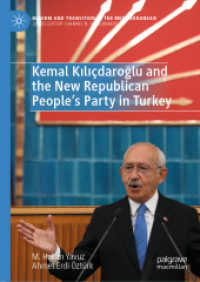- ホーム
- > 洋書
- > 英文書
- > Politics / International Relations
Full Description
Literature on the civil rights movement has long highlighted the leadership of ministerial men and young black revolutionaries, such as Reverend Martin Luther King, Jr., Stokely Carmichael, and Malcolm X. Recent studies have begun to explore female participation in the struggle for racial justice, but women continue to be relegated to the margins of civil rights history. In Our Minds on Freedom, Shannon Frystak explores the organizational and leadership roles female civil rights activists in Louisiana played from the 1920s to the 1960s. She highlights a diverse group of courageous women who fought alongside their brothers and fathers, uncles and cousins, to achieve a more racially just Louisiana.
From the Depression through World War II and the postwar years, Frystak shows, black women in Louisiana joined and led local unions and civil rights organizations, agitating for voting rights and equal treatment in the public arena, in employment, and in admission to the state's institutions of higher learning. At the same time, black and white women began to find common ground in organizations such as the YWCA, the NAACP, and the National Urban League. Frystak explores how women of both races worked together to organize the 1953 Baton Rouge bus boycott, which served as inspiration for the more famous Montgomery bus boycott two years later; to alter the system of unequal education throughout the state; and to integrate New Orleans schools after the 1954 Brown decision.
In the early 1960s, a new generation of female activists joined their older counterparts to work with the NAACP, the Congress of Racial Equality, and a number of local grassroots civil rights organizations. Frystak vividly describes the very real dangers they faced canvassing for voter registration in Louisiana's rural areas, teaching in Freedom Schools, and hosting out-of-town civil rights workers in their homes.
As Frystak shows, the civil rights movement allowed women to step out of their prescribed roles as wives, mothers, and daughters and become significant actors, indeed leaders, in a social-change structure largely dominated by men. Our Minds on Freedom is a welcome addition to the literature of the civil rights movement and will intrigue those interested in African American history, women's history, Louisiana, or the U.S. South.








